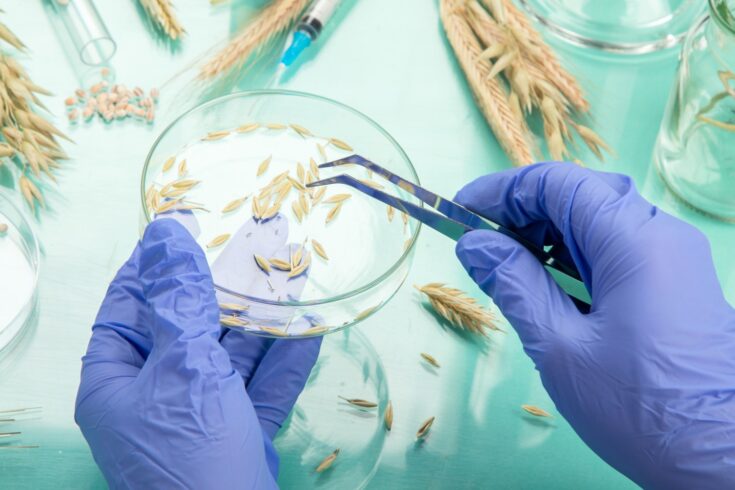Some of the best examples of new innovations catalysing the transition to net zero food production were on display last night at the House of Lords.
The TFP challenge celebrated the successes of the challenge at the event yesterday (13 November 2023), joined by over 100 senior figures from government, industry and investors.
The UK Research and Innovation (UKRI) TFP challenge is delivered by Innovate UK and the Biotechnology and Biological Sciences Research Council (BBSRC).
Delivering impact
The TFP challenge approaches its conclusion in March 2024, marked by a remarkable investment exceeding £68 million, and catalysing private co-investment of £394 million.
Here we look at some of the stand-out success stories from across the five years of the challenge.
The project case studies stand as a testament to the lasting impact of this initiative.
They demonstrate how the TFP challenge has been able to shape and support innovators on their path to solving key agri-tech issues.
They have set the UK on an international footing as an innovation leader through new ideas and technologies that are changing the face of food production.
Meet the innovators
The breadth of engagement, funding and overall success of the TFP challenge can be seen by the scope of these innovations, which spread across a number of key areas.
Traditional agriculture
Across traditional agriculture, CCm Technologies has developed novel low-carbon fertilisers from captured carbon dioxide with great success.
While Dunbia and Peacock Technology are making great strides in animal health monitoring, assessment and data sharing.
This work not only supports more sustainable animal rearing, but also supports breeding and meat production processes to remove inefficiencies from across the livestock chain.
Future food production systems
Meanwhile, algae grown in Moroccan desert land provided the focus for Brilliant Planet’s efforts to remotely source alternative protein opportunities for aquaculture and fish food. As well as looking ahead to food ingredient opportunities for humans.
Similarly, aquaculture and animal feed, as well as organic fertiliser, was the story behind Entocycle’s insectrial revolution.
Using black soldier flies, fed on previous food waste, the project provides a highly circular sustainable step in the food production chain.
International
Through an international funding partnership, Devenish has been working alongside Canadian company Mara, to introduce omega-3 polyunsaturated fatty acids into chicken feed.
This provides an alternative source of the health-beneficial docosahexaenoic acid beyond oily fish through chicken meat.
Business growth
Cutting-edge technology was also the cornerstone of the support provided to further develop several innovations already in progress.
From Dogtooth’s soft fruit picking robots to Spotta’s farm and forestry pest management software, digital technology is reshaping the landscape.
With the scientific work of Dyneval improving conception rates in dairy herds, and Uncommon’s lab-based alternative meat sources from cell to kitchen, groundbreaking concepts are moving at pace across the UK food sector.
Exploring the future of agri-tech: what’s next?
The valuable insights and expertise gained over the last five years are being put to good use through the Department for Environment, Food and Rural Affairs’ £270 million Farming Innovation Programme (FIP).
FIP is delivered by Innovate UK.
FIP will play a crucial role in enhancing the future efficiency, resilience and sustainability of the agri-food sector for years to come, taking the baton from the success of the TFP challenge.
Remarkable accomplishments
Dr Katrina Hayter, Challenge Director, Transforming Food Production at Innovate UK, said:
With the TFP Challenge drawing to a close, these projects serve as a testament to the enduring influence of this initiative.
They underscore the remarkable accomplishments of the projects that benefited from our financial backing and support.
In a world where food production methods and consumption patterns are undergoing significant transformation, these projects offer a glimpse into the future of a sustainable food system and industry.
Collaborative innovation
Professor Guy Poppy, BBSRC Interim Executive Chair and UKRI Food Sector Champion, said:
The Transforming Food Production Challenge stands as a beacon of collaborative innovation, driven by the needs of the industry and underpinned by a vital partnership between farmers, industry leaders and researchers.
It has set a precedent for how collaborative efforts can lead to significant advancements, exemplifying the synergy that occurs when the on-the-ground knowledge of farmers merges with the cutting-edge research of scientists.
As we move forward, the legacy of TFP is a testament to the power of collaboration in transforming the landscape of food production towards sustainability and efficiency.
This challenge demonstrates UKRI’s ongoing commitment to investing in research that can be effectively translated into practical, impactful solutions for sustainable food production worldwide.
Read the project case studies: catalysing the transition to net zero food production: delivering impact.

